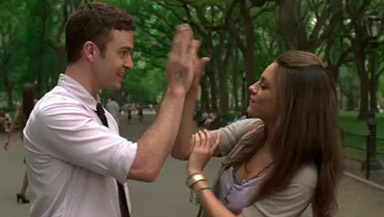Movie vs. Movie: Friendly and Stringless
Groundbreaking? Revolutionary? Not Exactly.
By Tom Houseman
April 23, 2012
Considering that No Strings Attached and Friends with Benefits were the movies that inspired me to start writing this column, I figure it's about time I compare them. However, doing has proven to be a surprisingly difficult task, not because the movies are difficult to compare and contrast, but because they are both so utterly forgettable. I sat down to watch Friends with Benefits less than a year after seeing No Strings Attached, and realized that I had forgotten virtually everything that happened in the Kutcher-Portman flick (I vaguely remember his dad being a jerk, but I could not for the life of me recall anything specific). A few days later I rewatched No Strings Attached so I could have something to say about it, and in that brief interim my memories of the Timberlake-Kunis joint had become remarkably fuzzy.
If my brain was a mesh sieve, then the these two romantic comedies are so slight that they slip through with almost no resistance. And yes, rom-coms are supposed to be light, forgettable fluff; that's part of their appeal. But considering I still have fairly substantial memories of tripe like Music & Lyrics (it helps that I can recite the entirety of Pop! Goes My Heart), you would think that two films that try to push the boundaries of what a romantic comedy can be would end up feeling slightly more substantial. Both films think that they are revolutionary in both the topic they present and the way they present it. If When Harry Met Sally is the definitive “can men and women be just friends?” film, then both of these films attempted to redefine the question for a sluttier generation: “can men and women be just friends who have sex?”
Of course, such a notion is not as revelatory as these films imagine it to be, and the target audiences of these films are likely very familiar with the idea of casual sex. But if Strings and Friends are not revolutionary, they are at least different, able to wear the mask of a traditional rom-com while sticking out their tongues, putting their thumbs in their ears and wiggling their fingers. Both films are charming in their own way, but it is the very disparate tactics each film uses to tell their story that show just how different they are not just from the '90s rom-coms from which they diverge, but from each other.
No Strings Attached
No Strings Attached attempts to find a sweet spot between old-fashioned rom-com and Apatow raunchiness. Its goal is to meld crude humor with earnest quirkiness, clever risque dialogue with goodnatured sentimentality. If Knocked Up breaks too much from the mold, Strings wants to be slightly less outrageous, slightly more traditional. It succeeds to a point, but sacrifices the opportunity to be interesting and memorable in the process.
Rom-coms (except for the few truly exceptional ones) are defined in part by how fake their characters are. The love interests seem designed for the express purpose of meeting each other, falling in love, being pulled apart by a tragic misunderstanding, and then overcoming their flaws so that they can be together at the end. Once the credits start rolling it is safe to assume that they evaporate. This is the problem that plagues Strings. The protagonists are as bland and simple as you can get. Emma is a doctor (my mother once told me that when the main female character in a movie is either a doctor or a stripper it is a sign that the character was lazily written) and Adam is a PA on a show that is similar to but for legal purposes not Glee. She is emotionally distant, he is a romantic, and that is all we need to know about these characters.
As in almost every rom-com, there is a cast of quirky supporting characters to act as sounding boards for the protagonists and inject witty repartee into every conversation. This group tends to be the best part of this kind of movie (Justin Bartha and Zoey Deschanel were the saving grace of Failure to Launch), and Greta Girwig, Mandy Kaling, Guy Branum, Jake Johnson, and Ludacris all pull their weight. But really, they serve no purpose other than to pepper dialogue with comedic banter, and never for a second do they feel like real people. Kevin Kline's obnoxious stoner dad character grates every moment he is on screen, the only character who is not only one-dimensional but actively detracts from the quality of the film.
Ivan Reitman makes the smart choice of directing Strings as if it were a comedy that just happens to be built around a romance, rather than a romance with jokes. The comedy always takes center stage, which makes the film entertaining enough, but the romance is unable to hold up its end of the bargain, and the more the film focuses on the plot the more it drags. Emma and Andy are such bland characters, and Portman and Kutcher have so little chemistry, that it is impossible to care about either of them. Strings works in a few ways, but in its goal to be a 21st Century When Harry Met Sally it comes up very short.
Continued:
1
2
3
|
|
|
|




